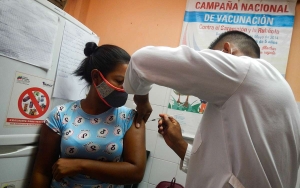Listen to Indigenous Voices for Effective Immunization

Understanding foundational scientific and public health concepts is clearly essential to accurately communicating with communities about vaccines and immunization. That is why Sabin’s Immunization Advocates program works with partners to offer media professionals the training, tools and connections they need to help families and communities across low- and middle-income countries get access to the facts about vaccination and inform decisionmakers to advance health policies.
Since the beginning of the COVID-19 pandemic, Sabin’s Immunization Advocates program and our partners have supported journalists in reporting on immunization and vaccines. In Latin America, media professionals have gathered voices from Indigenous communities across the region, to showcase the challenges they face and contribute to better-informed policies that include Indigenous Peoples more holistically to ensure they have access to vaccines.
Access to health services and facilities, misinformation and disinformation, a thorough understanding and respect for Indigenous Peoples’ culture, traditions and the way they understand the world, are some of the factors that journalists identified as possible gaps to more successful immunization campaigns in rural and remote communities.
Misinformation comes as a result of the lack of information in native languages regarding vaccines in several Indigenous communities. At the end of 2021, Journalist Juana García investigated this issue hampering vaccine acceptance in Yutuzani, a Triqui community in Oaxaca, Mexico. The Triqui people experienced vaccine inequity from a multitude of factors, including the lack of access to information in general and much less in the Triqui language.
Venezuelan journalist Mariana Souquett shed light on similar challenges faced by the Iindigenous Yukpas from the Sierra de Perijá in Zulia, Venezuela. Earlier this year, immunization efforts against COVID-19 had reportedly faced challenges in the Yupka community due to communication channels lacking an intercultural approach to medical information, general inaccessibility to health services due to transportation costs and infrastructure issues and a lack of vaccination resources and oversight. Many vaccination campaigns had failed to incorporate Indigenous communities’ worldviews and beliefs, according to Felipe Romero, promoter of the Ministry of Indigenous Peoples and Yupka chief, who received COVID-19 vaccination to set an example for the Yupkas. Community leaders and community health workers became pivotal figures in building trust within their communities.
Across the Amazon, about 30 million people needed to get vaccinated against COVID-19. In March 2022, Latin America-based correspondent Megan Janetsky reported that vaccination campaigns in the Andean Amazon saw success with efforts to gain trust thanks to the valuable efforts of Indigenous health workers traveling to hundreds of rural and hard-to-reach Indigenous communities in order to directly communicate about the benefits of the COVID-19 vaccine. While the trust-building strategy improved vaccination efforts, many Indigenous people continue having doubts, highlighting the importance of understanding the traditions and culture of Indigenous Peoples to build effective immunization campaigns.
Last April, journalist Lilian Martinez published a report on vaccination uptake amongst Indigenous populations in the Izalco, Santo Domingo de Guzmán and Nahuizalco municipalities in western El Salvador. In Izalco, there had been mixed reception to the COVID-19 vaccine, where some authority figures like the mayor of The Izalco rejected the vaccine as it is “something that comes from outside.” In the Cacaopera and Guatajiagua municipalities, Indigenous communities have largely accepted the vaccine and received their first two doses. Despite uptake of the first two doses, many remain skeptical of booster doses because of ineffective vaccination campaigns and inconsistencies in messaging.
Historically, health systems have neglected Indigenous populations, and the COVID-19 pandemic has only exacerbated challenges in adequately protecting Indigenous communities. In order to achieve global vaccine equity, it must be ensured that no one is left behind. Reporting from journalists supported by Sabin is pivotal in spotlighting the challenges faced by marginalized communities in their health systems and the factors that contribute to vaccine inequity.




